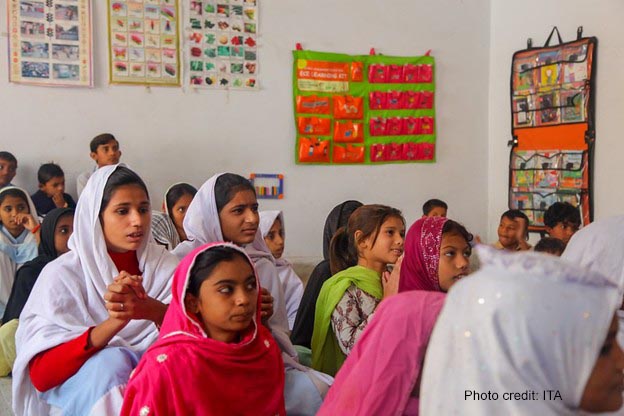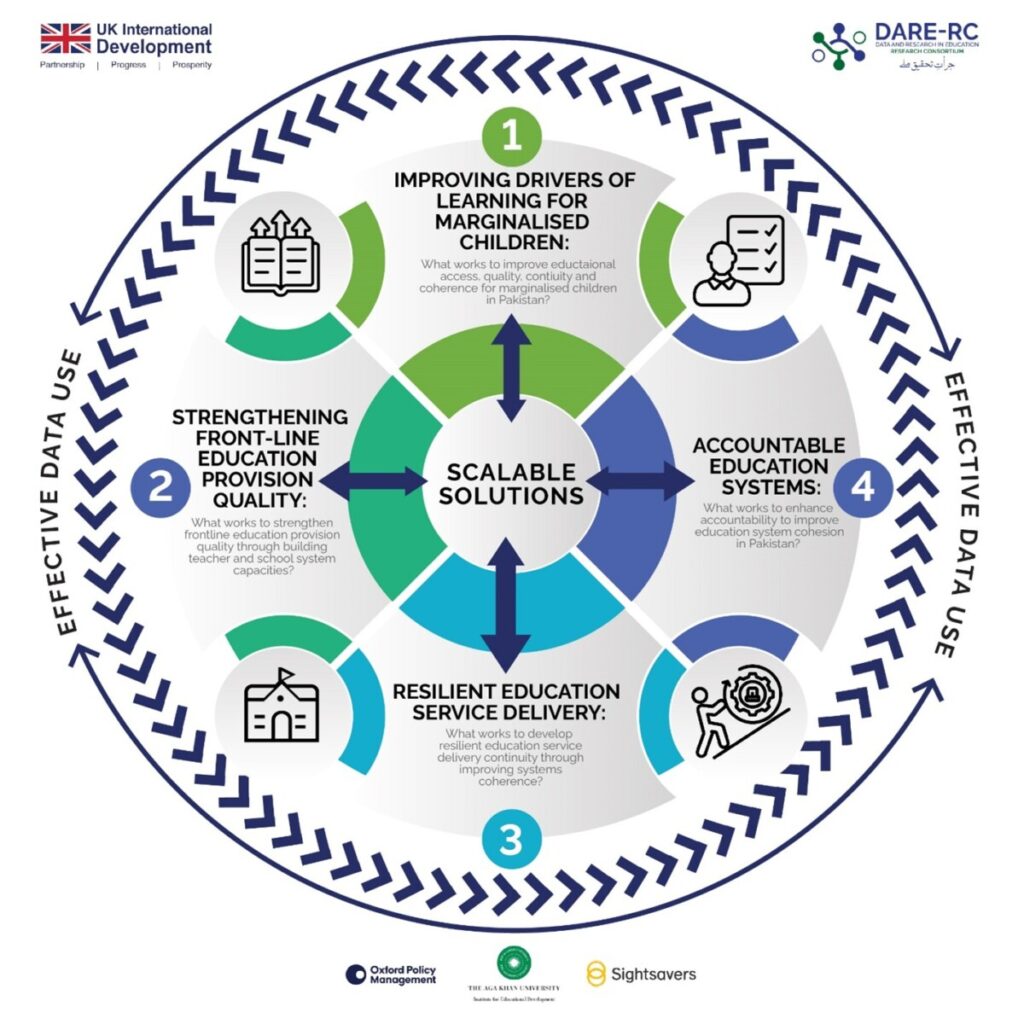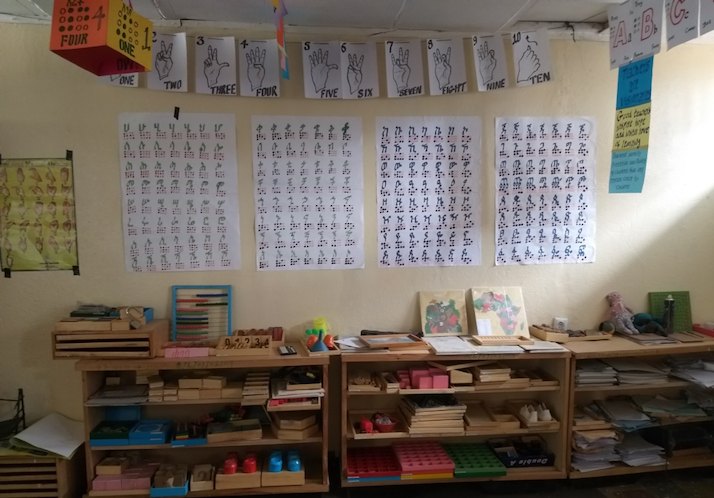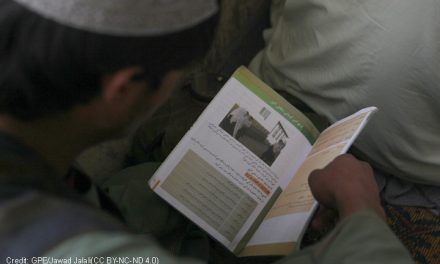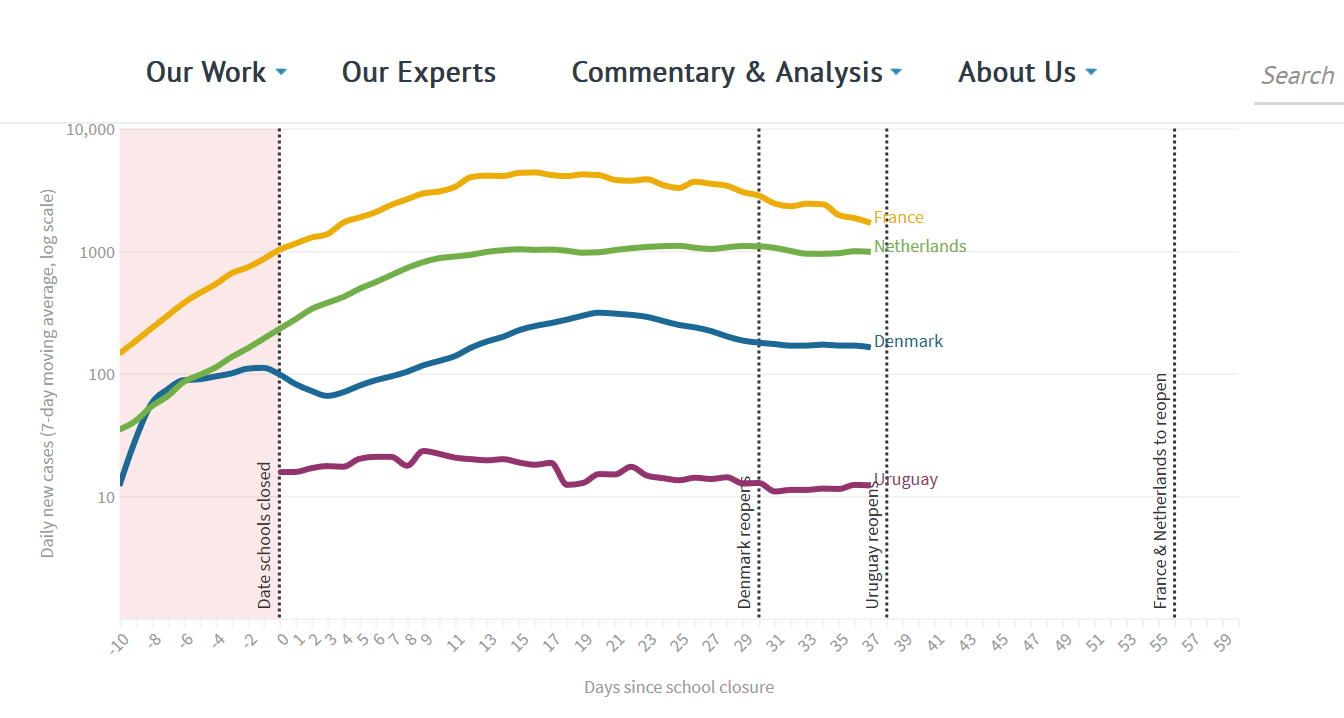This blog was written by Monazza Aslam, Research Director, and Ha Yeon Kim, Senior Advisor, Data and Research in Education Research Consortium (DARE-RC) in Pakistan.
Pakistan stands at a critical juncture in its education history
In May 2024, the Prime Minister of Pakistan, Shehbaz Sharif, declared an ‘Education Emergency’ across Pakistan. This declaration comes at perhaps the most critical juncture in Pakistan’s educational history – with 26 million children out of school and a country ranked as the 8th most vulnerable to the impacts of climate change. In 2022, Pakistan endured one of the most devastating climate disasters in its history: catastrophic floods that submerged one-third of the country, directly affecting over 33 million people, including 16 million children. More than 30,000 schools were damaged or destroyed, halting educational continuity and leaving marginalised children—especially girls, those with disabilities, and those from underserved regions like Balochistan and Sindh—disproportionately vulnerable. This tragedy , following very soon after the global Covid-19 pandemic in 2020, exposed the fragility of Pakistan’s education system, highlighting its inability to withstand systemic inequities and external shocks.
At the same time, a deeper learning crisis persists. In 2023, the Annual Status of Education Report (ASER) revealed that only 55 per cent of grade 5 students could read a simple Urdu story, and just 48 per cent could solve a basic two-digit division problem. These sobering figures reflect persistent and entrenched inequities and inefficiencies in the education system of the country. These are further exacerbated by decentralised governance structures and weak accountability mechanisms. Marginalised groups, especially in remote areas, remain at a stark disadvantage, perpetuating cycles of educational exclusion.
This dual crisis—the systemic inequities and vulnerability to shocks—underscores the urgent need for transformative, evidence-based reforms that ensure access to meaningful learning opportunities for all children.
DARE-RC is shaping the future of Pakistan’s education
The Data and Research in Education – Research Consortium (DARE-RC) is tackling these challenges head-on. Funded by the UK Foreign, Commonwealth & Development Office (FCDO), DARE-RC is a 30-month programme that collaborates with policymakers, civil society organisations, academics, and the research community to co-create and deliver a demand-led research agenda. The programme’s focus is to uncover what works, why it works, and how it can be scaled to create an education system that delivers access, quality, continuity, and coherence—especially for Pakistan’s most marginalised children.
Four research areas: Tackling Pakistan’s most pressing education challenges
- Improving drivers of learning for marginalised children
Despite constitutional guarantees of free and compulsory education under Article 25-A, systemic barriers persist for marginalised groups. For example, in flood-affected areas of Sindh, families often pull girls out of school to manage household chores, compounding existing gender disparities. DARE-RC’s research investigates the lived experiences and perspectives of the marginalised children in Pakistan, and identifies and tests alternative education delivery models—such as community-based education and public-private partnerships—to bridge these gaps and ensure equitable learning opportunities.
- Strengthening front-line education provision quality
At the heart of any education system are its teachers and school leaders. Yet, many in Pakistan face challenges such as inadequate professional development, particularly for multi-grade or multilingual classrooms. DARE-RC supports research on innovative teaching approaches and teacher workforce management policies and practices that reflect the diverse reality and needs of Pakistan’s classrooms.
- Resilient education service delivery
Pakistan’s education system is highly vulnerable to climate shocks, as demonstrated by the 2022 floods. DARE-RC explores strategies to maintain educational continuity during such crises. This includes from integrating climate education into school curricula to preparing schools and communities for unforeseen climate disasters with evidence- and data-driven policies and practices. Ensuring safe and continuous learning environments for all children is central to this effort.
- Accountable education systems
A lack of transparency and accountability often impedes progress in education reforms. DARE-RC focuses on understanding the political and administrative barriers that prevent effective policy implementation. For example, decentralisation reforms, such as Sindh’s School Clustering Policy (2021), aim to empower local communities but often face challenges in resource allocation and accountability. DARE-RC focuses on understanding these barriers and leveraging school monitoring systems and governance reforms to drive meaningful improvements.
Cross-cutting themes: Amplifying impact
DARE-RC’s research agenda is guided by two cross-cutting themes to amplify its impact of the research on four priority areas:
- Effective data use: Equipping decision-makers to have access to actionable, high-quality data to identify disparities and drive improvements in Pakistan’s diverse education landscape.
- Scalable solutions: Identifying and scaling promising programmes, strategies, and policies to deliver high-quality education to all children, particularly the most marginalised.
A vision for holistic transformation of Pakistan’s education system
As Pakistan rebuilds from the devastating floods and confronts persistent education challenges, initiatives like DARE-RC hold the promise of driving transformative change. Now more than ever, investing in research and evidence-based policymaking is essential to build an education system resilient to shocks and inclusive of all children.
DARE-RC envisions a future where every child in Pakistan, regardless of gender, location, disability, religion, or socioeconomic background, has access to high-quality education. By addressing systemic barriers, scaling successful interventions, and leveraging evidence-based practices, DARE-RC is driving systematic change to reshape Pakistan’s education landscape. Through its collaborative, data-driven approach, the programme aspires to build a resilient, inclusive, and equitable education system capable of delivering meaningful learning outcomes for generations to come.
Together, with research, innovation, and collaboration, DARE-RC is not just responding to Pakistan’s education crisis—it is transforming its future.

